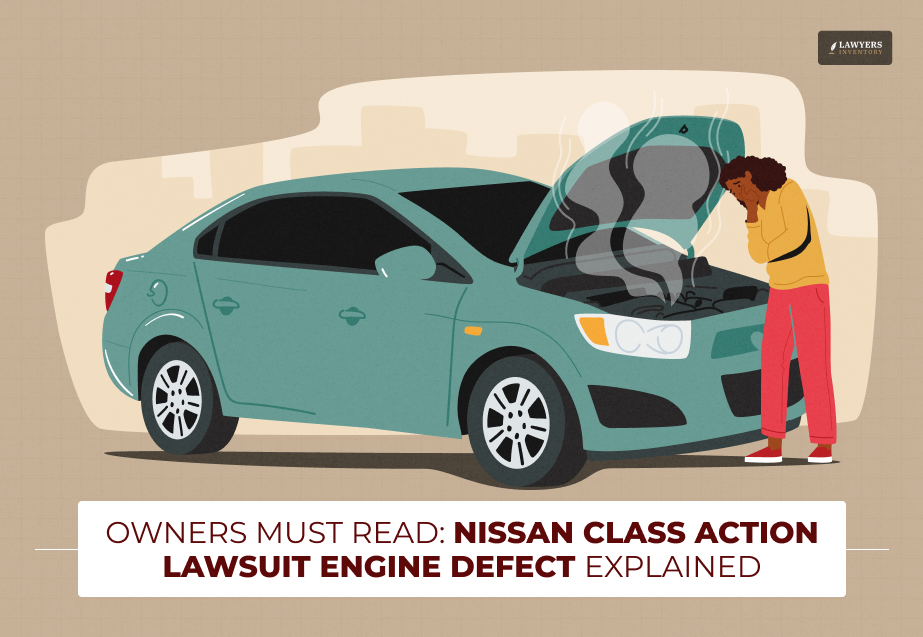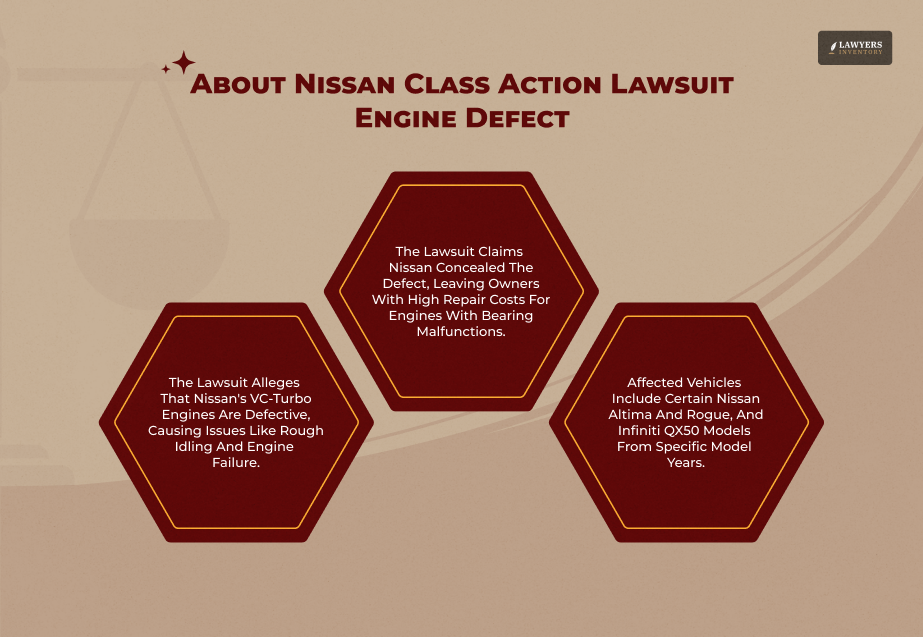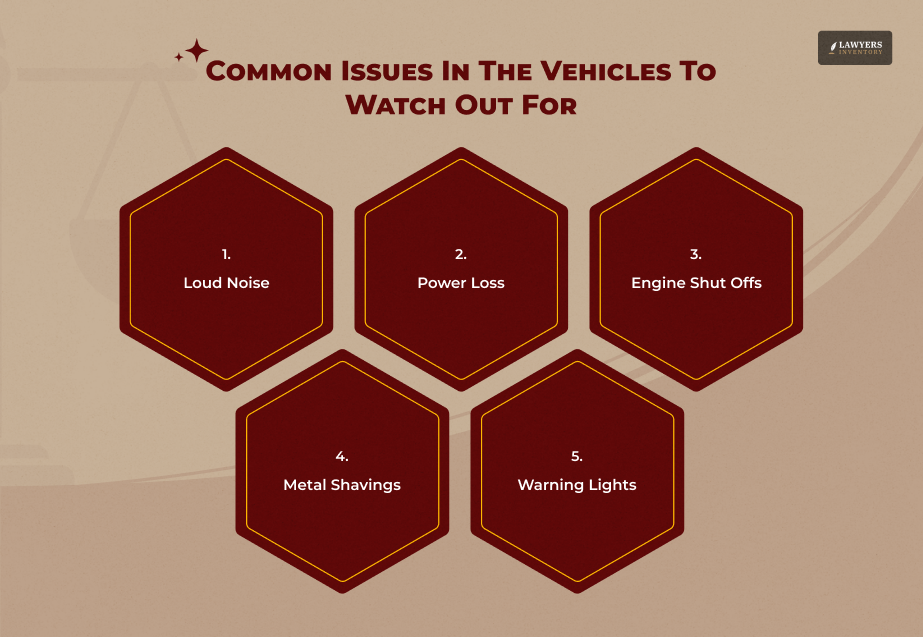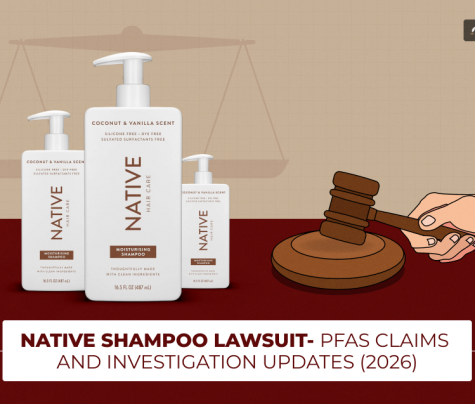
The problem is that thousands of drivers all over the nation are affected. The owners of some models of Nissan and Infiniti are in jeopardy of going through sudden engine failure with their vehicles. They now seek justice through a Nissan Class Action Lawsuit Engine Defect filing.
Nissan is recalling nearly half a million vehicles over a defect that could cause engine failure, according to the Independent.
This guide details alleged defects, pinpoints those with affected vehicles, and provides crucial step-by-step guidance for owners. You need to know your rights right now.
Overview Of The Nissan Class Action Lawsuit Engine Defect

Class-action lawsuits against Nissan involve allegations that the manufacturer concealed major defects in both its popular DIG and VC-Turbo engines. The plaintiffs say the company knowingly sold vehicles with such defects.
They further claim that when problems arose, effective remedies were not offered by Nissan.
What Vehicles Are Affected?
Most of the claims primarily target models with the VC-Turbo engine, known as KR20DDET, or the newer DIG engine design.
Currently, vehicles named in the Nissan Class Action Lawsuit Engine Defect include:
- 2021–2023 Nissan Rogue
- 2019–2023 Nissan Altima
- 2019–2023 Infiniti QX50
If you have one of these models, you should pay close attention to the symptoms from the engine. You could then be eligible to participate in the Nissan Class Action Lawsuit Engine Defect.
Nissan Class Action Lawsuit Engine Defect – What Defects Are Alleged?

The complaints are based on several different mechanical issues. These usually end in expensive, non-warranty repairs or complete engine failure.
VC-Turbo Bearing Failure
The most serious allegation is that the multi-link piston mechanism of the VC-Turbo is overly prone to wear. The defect thus causes failure of either the main, A/C, or L-link bearings and destroys the whole engine entirely [Motor1.com].
Fuel Dilution
Some Rogue models featuring DIG engines reportedly have a different design flaw that allows excessive fuel dilution. This contaminates the engine oil and degrades lubrication, causing internal components to fail.
PCV System Gas Fumes
The second major basis of the Nissan Class Action Lawsuit engine defect is related to the Positive Crankcase Ventilation system.
Here’s what Unión Rayo EN stated:
“Goodbye to Nissan as we knew it—a class action lawsuit accuses the company of selling cars with defective VC-Turbo engines without warning its customers since 2019”.
According to ClassAction.org, this defect is said to allow raw gasoline fumes into the vehicle cabin and could present a health and/or safety danger to those riding in the vehicle.
Technical Details- The VC-Turbo Defect
Nissan had come up with the revolutionary VC-Turbo engine. This allowed the engine to change its compression ratio electronically. The end result of such a feature was a balancing between power and fuel efficiency.
The system’s complexity is allegedly its downfall, according to the Nissan Class Action Lawsuit Engine Defect.
Variable Compression Technology Explained
It uses the VC system with an eccentric, multilink mechanism that couples the crankshaft to the pistons. By repositioning the pivot point of this link, it can make an instant transition from the low-compression ratio needed for turbo performance to the high-compression ratio required for fuel economy.
The complex mechanism creates unusually extreme, non-uniform stress on the bearings of the connecting rod and link that is beyond normal wear limits, the lawsuit alleges.
Nissan Class Action Lawsuit Engine Defect-Common Failure Clues To Watch For

The owners have reported clear warning signs of the defect in the Nissan Class Action Lawsuit Engine. You should watch for these symptoms:
- Noises, Loud: Any high-pitched whirring or metallic knocking, especially when at an idle, or during acceleration.
- Loss of Power: Sudden or dramatic reduction in engine performance.
- Engine Shut-Off: Vehicle stalls while either driving or idling.
- Warning Lights: Illumination of “Engine Malfunction Power Reduced” message or the standard check engine light.
- Metal Shavings: The presence of metallic pieces or scraps during oil change.
Nissan’s Official Statement
While Nissan indeed took some steps toward improvement with a few of the issues, most owners cited that these were not enough.
History Of Recalls And Warranty Extensions
The company has issued recalls for certain affected vehicles. For example, the firm announced a safety recall to fix another problem that may affect almost half a million cars.
Additionally, Nissan conducted warranty campaigns for VC-Turbo engines. As a result, they extended coverage on some of these engine components for certain owners.
Why The Owners Consider The Response Inadequate
These repairs, the lawsuits claim, often do not correct the core design defect. If one simply replaces a component or issues a software update, that does not change the basic engineering flaw contributing to repeated bearing wear.
Because of this fact, owners of such repaired engines fear their engines will only fail again once the new warranty has expired. This continued risk supports the ongoing Nissan Class Action Lawsuit Engine Defect.
Your Legal Rights And Claims
A class action streamlines the legal process for thousands of people having the same problem.
What Is A Class Action?
The class action pools many plaintiffs into one suit. This is particularly effective when a manufacturer has allegedly engaged in some widespread wrong. The action represents all members.
Legal Claims Being Asserted
Several key claims the plaintiffs make against Nissan:
- Breach of Warranty: The plaintiffs argue that Nissan breached both express and implied warranties by selling defective vehicles.
- Magnuson-Moss Warranty Act: This federal act protects consumers against breach of warranty by the manufacturer. The lawsuits charge that Nissan has breached this act by not making permanent repairs.
- State Consumer Protection Statutes: Claims involve violations of state laws prohibiting unfair or deceptive business conduct.
Compensation Sought
Plaintiffs are seeking various forms of relief. These remedies address both the direct cost of repair and the diminished value of the vehicle. Possible relief includes:
- Reimbursement for all past out-of-pocket repair expenses
- Funding of future engine replacement or major repairs.
- Damages for the diminished resale value of the subject vehicle.
- Extensions of the existing warranty coverage.
Read Also: What Is The Vintage Broncos Ford Lawsuit About?
What Affected Owners Must Do Now- Checklist
To protect your claim in the Nissan Class Action Lawsuit Engine Defect, you will have to be proactive. The most powerful tool for this is organized documentation.
Evidence You Must Gather
Keep these things organized and safe:
- Sales or Lease Documents: The original contract showing when you acquired the vehicle.
- Full Service History: All oil changes and maintenance are documented.
- Repair Orders: All invoices, work orders and dealer diagnoses which concern problems with the engine.
- Communication Log: Includes notes, emails, or texts describing each contact made with either the Nissan dealership or corporate customer service.
- Proof of Symptoms: Videos or audio recordings of any loud noises or warnings before taking the car in for repair.
Timing Is Everything
Statutes of limitation – the time limits for filing a claim-can vary quite significantly depending on the state. Document your symptoms and costs now for a successful part in the Nissan Class Action Lawsuit Engine Defect.
If you think that your engine exhibits any signs of failure, do not delay.
Compensation And Expectations- Nissan Class Action Lawsuit Engine Defect
Understanding what compensation looks like sets realistic expectations.
Precedent From The Nissan CVT Class Action Settlement
For a useful comparison, consider the earlier Nissan CVT Class Action Settlement. Relief in that case included warranty extensions and reimbursement for some transmission repairs and parts. However, class action payouts are often modest, designed to reimburse losses rather than award massive windfalls.
Value Determinants
Your potential compensation in the Nissan Class Action Lawsuit Engine Defect will be determined based on:
- The severity of the defect-full failure versus minor noise.
- Your out-of-pocket expenses for repairs not covered under warranty.
- Whether you still own the vehicle
- Final total size of the settlement fund.
Safety And Best Practices
Aside from it being expensive, it is also unsafe to have a defective engine. Sudden failure of the engine while on the wheel can be very hazardous.
Safety Guidance If severe symptoms appear, like heavy smoke, metallic grinding, or flashing warning lights, your best option would be to stop driving at once. Call the dealership or a certified mechanic, and have it towed. Never drive through these warnings; your primary concern is keeping yourself and others safe.
Engine Health Monitoring
Always follow the recommended maintenance schedule for your vehicle. While this has absolutely nothing to do with the root cause of the Nissan Class Action Lawsuit Engine Defect, it will ensure that Nissan can’t deny warranty claims due to neglect.
Use high-quality synthetic oil and check your oil level and quality often.
Read Also: How To Claim Money In The GM Class Action Settlement?
Frequently Asked Questions (FAQs):
If you own an affected vehicle, the time is now to get evidence to protect your claim.
The class-action lawsuit targets the VC-Turbo and DIG engines of the 2021–2023 Nissan Rogue, 2019–2023 Nissan Altima, and 2019–2023 Infiniti QX50. In other words, these are models most reported for failure in the context of the Nissan Class Action Lawsuit Engine Defect.
The relief generally comes as monetary compensation for repairs you paid for, reimbursement of diminished vehicle value, or an extended warranty. Compensation depends on the final settlement agreement, but it is supposed to cover your economic loss.
The general answer is yes, Public knowledge of a potential defect in the VC-Turbo lowers the resale value for many models. If you sold your vehicle at a loss due to the issue, you might still have a chance to file a claim for that lost value. The Nissan Class Action Lawsuit Engine Defect is an active class action lawsuit fought today.
This means that, to protect their investment, owners will need to be well-informed, document every issue, and explore all possible legal avenues.












0 Reply
No comments yet.